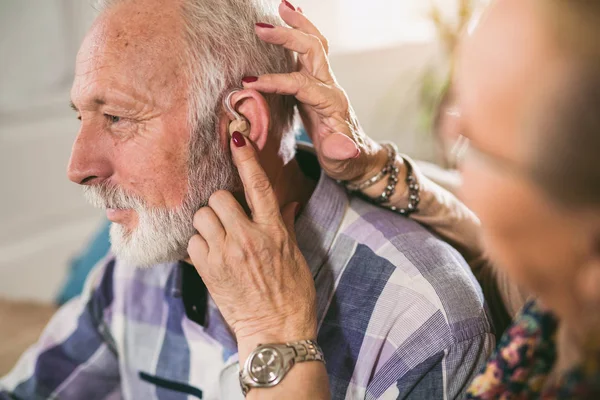Uncover the Link Between “Using Hearing Aids and Increased Life Expectancy” That’s correct! Utilizing hearing aids can indeed contribute to a longer life. A groundbreaking study featured in The Lancet Healthy Longevity journal discovered that adults experiencing hearing loss who consistently wore hearing aids were at a 24% lower risk of premature death compared to those who did not use them. This significant discovery highlights the potential of treating hearing loss to positively affect overall well-being and increase lifespan.

Here’s how it might work:
- Improved cognitive function: Untreated hearing loss can lead to social isolation and decreased cognitive engagement, which have been linked to an increased risk of dementia and other cognitive decline. Hearing aids can help restore hearing and improve communication, potentially reducing these risks.
- Reduced stress and anxiety: Hearing loss can be frustrating and isolating, leading to increased stress and anxiety. Hearing aids can help alleviate these negative emotions and promote mental well-being.
- Physical health benefits: Hearing loss is associated with an increased risk of falls, accidents, and hospitalizations. Hearing aids can improve balance and coordination, reducing the risk of falls, and can also help people stay more connected and engaged in activities that benefit their physical health.
- Better overall health management: People with hearing loss may be less likely to seek preventive care or adhere to treatment plans for chronic conditions. Hearing aids can improve communication with healthcare providers and help people manage their health more effectively.
It’s crucial to understand that this research was observational and does not establish a direct cause-and-effect relationship. Nonetheless, the results are compelling and indicate a potential genuine link between the use of hearing aids and longer life expectancy.
For those experiencing hearing loss, it’s essential to consult with your physician about undergoing a hearing evaluation and discussing the available treatment options. Hearing aids can be an essential resource for enhancing your life quality and possibly extending your years.
Here are some additional things to keep in mind:
- The benefits of hearing aids may vary depending on the severity of your hearing loss and how long you have been experiencing it.
- It is important to choose the right hearing aids for your needs and to get fitted by a qualified audiologist.
- There are many different types of hearing aids available, so be sure to do your research and find the ones that are right for you.
Further resources:
It’s fantastic that research is uncovering potential benefits of treating hearing loss beyond improved communication. This study offers strong encouragement for people with hearing loss to consider using hearing aids, not only for better quality of life but also for potentially living longer!
Frequently Asked Questions (FAQs)
1. How do wearing hearing aids contribute to longevity?
Wearing hearing aids can contribute to a longer, healthier life in several ways. Firstly, they improve communication and social interaction, reducing feelings of isolation and depression which are known risk factors for a shorter lifespan. Secondly, they help in reducing cognitive decline by keeping the brain engaged in active listening processes. Lastly, by improving hearing, hearing aids decrease the risk of falls and accidents, which are common causes of injury and death in older adults.
2. Can hearing aids actually improve cognitive functions?
2.1. Impact on Cognitive Decline
Yes, studies have shown that hearing aids can slow down cognitive decline in older adults. By enhancing hearing, these devices support active engagement in social and communicative activities, which stimulates brain function and helps maintain cognitive health.
2.2. Relationship with Dementia
Furthermore, there is evidence that wearing hearing aids may lower the risk of developing dementia. Hearing loss, if untreated, is a significant risk factor for dementia. By addressing hearing loss with aids, individuals may reduce their risk of cognitive decline associated with dementia.
3. What are the social benefits of wearing hearing aids?
Hearing aids offer several social advantages, including:
- Improved Communication: Better hearing makes conversations easier and more enjoyable, enhancing social interactions.
- Increased Participation: Individuals with hearing aids are more likely to take part in social activities, reducing feelings of isolation.
- Better Relationships: By facilitating clearer communication, hearing aids can improve relationships with family and friends.
4. Are there any additional health benefits of using hearing aids?
Yes, beyond the primary benefits of addressing hearing loss, hearing aids offer additional health advantages, such as:
- Reduction in stress and frustration associated with strained listening.
- Decreased risk of falls by improving spatial awareness and balance.
- Higher overall quality of life through improved mental health and emotional well-being.
5. How can one know if they need a hearing aid?
Signs that might indicate the need for a hearing aid include:
- Difficulty understanding conversations, especially in noisy environments.
- Frequently asking others to repeat themselves.
- Increasing the volume on the television or radio to levels others find too loud.
- Noticing a ringing or humming noise in the ears, known as tinnitus.
If you experience any of these signs, consulting with an audiologist for a comprehensive hearing test is recommended.
6. Is there an adjustment period for getting used to hearing aids?
Yes, there is typically an adjustment period for new hearing aid users. It can take several weeks to months to fully adapt to hearing aids. During this time, sounds may seem unusually loud or different. Audiologists recommend a gradual increase in wearing time and provide guidance for adjusting settings to ease the transition.
7. How long do hearing aids usually last?
The lifespan of a hearing aid typically ranges between 5 to 7 years. This can vary based on the type of hearing aid, level of maintenance, and how often it is used. Regular cleaning and professional check-ups can help extend the life of hearing aids.






